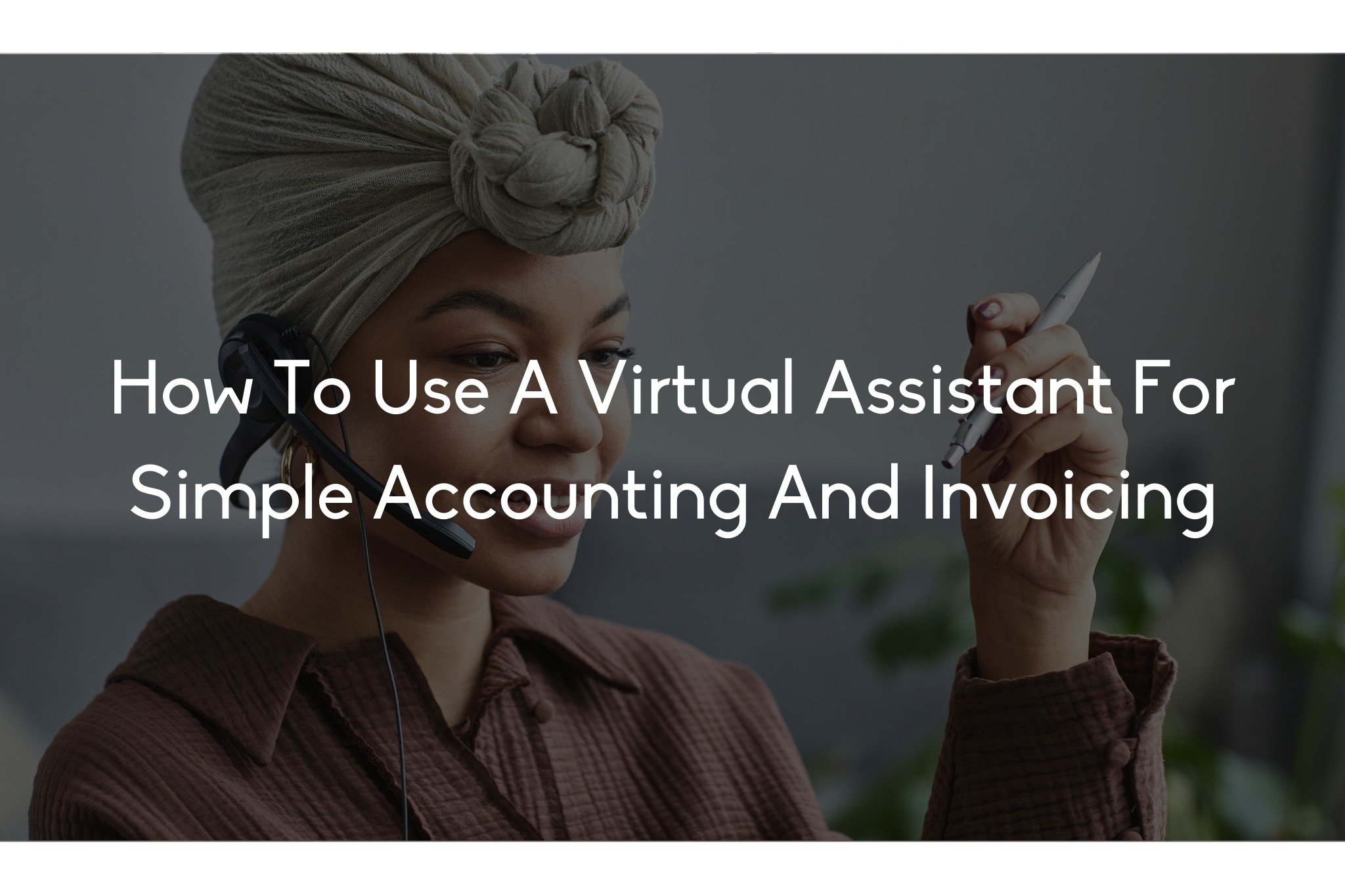
Accounting and invoicing are crucial tasks in any business. But let’s face it—handling these on top of everything else can be overwhelming. You know your financial records need to be up-to-date, and payments should come in on time, but managing it all yourself often feels like a full-time job.
This is where a virtual assistant (VA) comes in. By handing off some of these routine tasks, you can ensure your finances stay organized without the stress. Think of it as having a reliable, efficient, and affordable “assistant” who takes care of the numbers, leaving you free to focus on what really matters—growing your business.
Let’s dive into how a virtual assistant can make accounting and invoicing simpler and more manageable.
You might be asking, “Can a virtual assistant really handle my accounting and invoicing?” The answer is yes! With the right systems in place, a VA can take over many of these time-consuming tasks. Whether you’re a freelancer, a small business owner, or just starting out, using a VA for your accounting and invoicing can save you valuable time and energy.
Read on to find out how a virtual assistant can help you streamline these processes and make your business run more smoothly.
Let’s break down how a virtual assistant can handle your accounting and invoicing needs. Whether you’re just starting your business or you’re looking for a more efficient way to stay on top of your finances, a VA can be the key to simplifying these tasks.
What Can a Virtual Assistant Do for Your Accounting?
A virtual assistant can take care of a variety of routine accounting tasks. These include:
- Expense Tracking: Your VA can track every expense, from office supplies to subscriptions. Instead of worrying about keeping receipts or manually entering data into spreadsheets, your VA will make sure everything is logged properly, helping you stay organized and prepared for tax time.
- Bank Reconciliation: Reconciling your accounts with your bank statements is essential to avoid errors. A VA can handle this by cross-referencing transactions and identifying discrepancies. This helps ensure that your accounting records are accurate and up-to-date.
- Generating Financial Reports: While you might not need complex financial statements every week, your VA can generate basic reports to help you understand your business’s cash flow, income, and expenses. These reports allow you to make better decisions and stay proactive with your finances.
- Tax Preparation Help: Your VA won’t file your taxes, but they can help prepare for tax season. They’ll ensure your records are organized, receipts are sorted, and invoices are up to date, making tax filing a smoother process when the time comes.
By delegating these tasks to a virtual assistant, you can stay on top of your finances without spending endless hours tracking receipts or managing spreadsheets.
Invoicing: A Task That Doesn’t Have to Be Time-Consuming
Invoicing is a necessary part of doing business, but it can quickly eat up your time. Here’s how a VA can simplify this task:
- Creating and Sending Invoices: A virtual assistant can create and send invoices for you. By using pre-set templates, your VA can fill in the client details, project information, and pricing. Once the invoice is ready, they can send it off on your behalf, ensuring clients get billed on time.
- Automated Payment Reminders: Waiting for payments can be stressful. But with a VA, you don’t have to chase down overdue payments. They can automatically send follow-up emails to remind clients when their payments are due or overdue.
- Tracking Payments: Your VA can track which invoices have been paid and which ones are still outstanding. This means you don’t have to manually check payment statuses. Instead, your VA will keep you informed so you can focus on other tasks.
Having a VA handle your invoicing means fewer delays in getting paid and less time spent chasing clients. Plus, it ensures a steady cash flow, which is vital for any business.
Choosing the Right Virtual Assistant for the Job
Not all virtual assistants are equipped to handle accounting and invoicing. When choosing a VA, look for the following:
- Familiarity with Accounting Tools: A great VA should be familiar with popular accounting software like QuickBooks, Xero, or FreshBooks. They don’t have to be experts, but they should be able to navigate these tools and perform basic tasks like creating invoices or tracking expenses.
- Attention to Detail: Accounting is all about accuracy. Your VA should be meticulous when it comes to tracking transactions and sending invoices. Small errors can cause big problems down the line, so it’s essential that your VA has a sharp eye for detail.
- Communication Skills: Clear communication is key. Your VA should be able to keep you updated on financial matters and ask questions when necessary. Good communication ensures that you’re always in the loop and that any issues are addressed quickly.
- Basic Accounting Knowledge: While your VA doesn’t need to be a certified accountant, having a basic understanding of accounting principles (like debits, credits, and general ledgers) is crucial. This will help them manage your finances accurately.
By choosing the right VA, you can offload your accounting and invoicing tasks with confidence, knowing that they’ll be handled professionally and accurately.
How to Set Up Your Virtual Assistant for Success
Once you’ve chosen your VA, it’s time to get them set up for success. Here are some steps to ensure they’re prepared to handle your financial tasks:
- Provide Clear Instructions: Make sure you explain your expectations clearly. Outline exactly what you need your VA to do—whether it’s tracking expenses, sending invoices, or generating reports. The more specific your instructions, the better the results.
- Give Access to Tools: Your VA will need access to the tools you use, like accounting software, email, or cloud storage. Ensure they have the necessary logins and permissions to complete their tasks.
- Set Up Templates: To make invoicing easier, set up templates with your business information, logo, and typical charges. Your VA can then simply fill in the details for each client, speeding up the process and ensuring consistency.
- Establish a Communication Routine: Regular communication is essential to keeping everything on track. Decide how often you want updates—weekly, bi-weekly, or monthly—and stick to that schedule. Regular check-ins will keep you informed and help avoid any issues.
By setting your VA up with the right tools and guidelines, you’ll make their job easier and ensure that your financial tasks are handled efficiently.
The Benefits of Using a Virtual Assistant for Accounting and Invoicing
Still not sure if a virtual assistant is right for your accounting needs? Here are some key benefits:
- Time Savings: With a VA handling your accounting and invoicing, you’ll have more time to focus on the things that matter most—like running your business and serving your clients. You’ll no longer need to spend hours on spreadsheets or chasing down payments.
- Accuracy and Consistency: A virtual assistant ensures that your financial records are accurate and up-to-date. This consistency helps reduce the risk of errors and makes it easier to stay on top of your finances.
- Cost-Effective: Hiring a full-time employee to handle your accounting and invoicing can be expensive. A virtual assistant is a more affordable option, especially if you only need help part-time or for specific tasks.
- Improved Cash Flow: With timely invoicing, automated reminders, and accurate payment tracking, a VA helps keep your cash flow steady. This can be especially helpful for businesses that rely on a consistent income stream to function smoothly.
By using a virtual assistant, you’ll streamline your accounting processes, reduce stress, and create a more efficient business.
Conclusion:
Running a business is challenging enough without having to worry about managing accounting and invoicing. With the help of a virtual assistant, you can offload these time-consuming tasks and ensure that your financial processes are handled professionally. Whether you’re a freelancer, small business owner, or just getting started, a VA can be the solution you need to keep your finances in check and your business running smoothly. Ready to make your life easier? Find the perfect VA and start simplifying your accounting and invoicing today.



